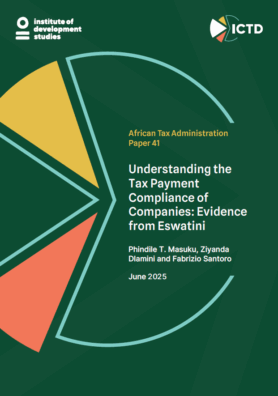African Tax Administration Paper 41
Corporate income tax (CIT) compliance is a critical aspect of maintaining a fair and robust tax system. It ensures that businesses fulfil their legal tax obligations and contribute their fair share to public finances. However, achieving high compliance rates is often challenging due to various factors including, among others, the complexity of the tax system, economic factors (income levels, audit probabilities, liquidity constraints, tax benefits etc.) and businesses’ perceptions about the tax system and government.
The Eswatini Revenue Service (ERS) database was used to access returns and payments data covering a six-year period from 2017 to 2022, to study patterns of non-compliance with CIT tax payments and to understand the key factors explaining them. We present several results. First, large firms are more likely to comply with tax payments compared to smaller businesses. This results in the smaller companies attracting interest and penalties on top of their declared liabilities. Second, in terms of sectoral analysis, the tertiary sector evidently recorded the highest compliance with tax payments. Third, payments made through electronic bank transfers were associated with being timely and more complete than those made through cash and by card. However, mobile money payments do not perform as well as electronic transfers in terms of being associated with timely payments. Additionally, taxpayers in their first three years since registration were found to be more likely to comply when compared to those that have been in the system for longer. Lastly, the correlational evidence revealed that taxpayers filing their tax returns late were less likely to pay their liabilities and that compliance was found to be higher for taxpayers who correctly filed two provisional declarations and one annual tax return in the year.
From the findings of the study, some administrative and policy considerations can be adopted by the ERS, in order to enforce and support compliance with CIT. These include strategies to ensure simplified processes for smaller taxpayers to reduce their tax compliance burden, and proactive approaches to boosting voluntary compliance, such as investing in comprehensive taxpayer education programmes.
